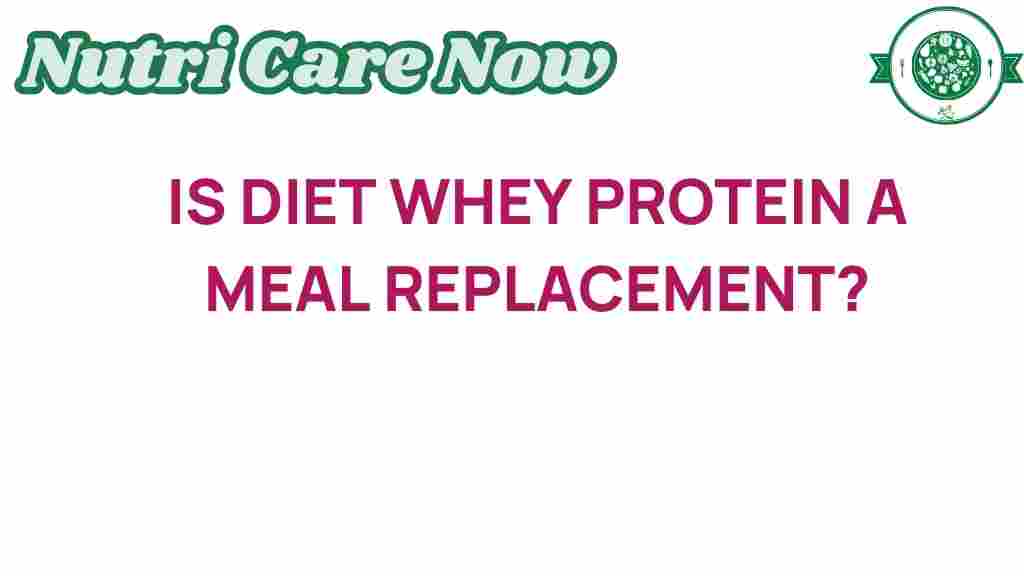Is Diet Whey Protein the Ultimate Meal Replacement Solution?
In the quest for optimal health and fitness, many individuals are turning to dietary supplements to help them reach their goals. Among these supplements, diet whey protein has gained immense popularity as a potential meal replacement solution. But is it the ultimate answer for those looking to improve their nutrition, support weight loss, and enhance muscle recovery? In this article, we will explore the benefits and considerations of using diet whey protein as a meal replacement, how it fits into a healthy lifestyle, and whether it truly lives up to its promises.
Understanding Diet Whey Protein
Diet whey protein is a high-quality protein derived from milk during the cheese-making process. It is a complete protein, meaning it contains all essential amino acids required for the body’s needs. Compared to regular whey protein, diet whey protein typically has lower calories, less fat, and reduced carbohydrates, making it an appealing choice for those on a weight loss journey.
The Health Benefits of Diet Whey Protein
Incorporating diet whey protein into your diet can offer numerous health benefits:
- Supports Weight Loss: Diet whey protein can help reduce appetite and increase feelings of fullness, which may lead to lower overall calorie intake.
- Enhances Muscle Recovery: Consuming protein after exercise is crucial for muscle repair and growth. Diet whey protein provides the necessary amino acids to aid in recovery.
- Boosts Metabolism: Protein has a higher thermic effect than fats or carbohydrates, meaning you burn more calories digesting it.
- Improves Nutritional Intake: It can help individuals meet their daily protein requirements, especially those who struggle to get enough from whole foods.
How to Use Diet Whey Protein as a Meal Replacement
Using diet whey protein as a meal replacement is simple and can be tailored to fit your needs. Here’s a step-by-step guide to effectively integrate it into your diet:
Step 1: Choose the Right Product
Not all diet whey protein supplements are created equal. Look for products that are low in sugar and artificial ingredients. Check the protein content per serving and ensure it aligns with your dietary goals.
Step 2: Determine Your Caloric Needs
To effectively replace a meal with diet whey protein, calculate your daily caloric needs. This will help you determine how much protein you should consume, along with other macronutrients.
Step 3: Create a Balanced Shake
While diet whey protein can replace a meal, it’s essential to make it nutritionally balanced. Consider adding:
- Healthy Fats: Include ingredients like nut butter, avocado, or flaxseeds.
- Fiber: Add fruits (like bananas or berries) or vegetables (like spinach) for fiber and vitamins.
- Carbohydrates: If needed, incorporate oats or whole grains for sustained energy.
Step 4: Blend and Enjoy
Mix your diet whey protein with water, milk, or a milk alternative in a blender. Experiment with different ingredients and flavors to find what works best for you.
Common Misconceptions About Diet Whey Protein
As with any dietary supplement, there are misconceptions surrounding diet whey protein. Here we address some common myths:
- Myth 1: Protein shakes can fully replace whole foods. While they are convenient, they should not entirely replace whole food sources.
- Myth 2: All protein powders are the same. Quality varies significantly, and it’s important to choose a reputable brand.
- Myth 3: Diet whey protein is only for athletes. It can benefit anyone looking to improve their nutrition or weight management.
Potential Downsides of Diet Whey Protein
While diet whey protein has many benefits, it’s essential to be aware of potential downsides:
- Digestive Issues: Some individuals may experience bloating or discomfort. Start with smaller servings to assess tolerance.
- Allergies: Those with dairy allergies should avoid whey protein altogether.
- Over-reliance: Relying too heavily on supplements can lead to nutritional imbalances. Always prioritize whole foods.
Incorporating Diet Whey Protein into Your Fitness Routine
Integrating diet whey protein into your fitness regimen can maximize its benefits. Here’s how:
Post-Workout Recovery
After a workout, your muscles need protein for repair. Consuming a diet whey protein shake within 30 minutes post-exercise can help kickstart muscle recovery.
Meal Timing
Consider timing your protein intake throughout the day. Having a shake for breakfast or as a mid-afternoon snack can help maintain energy levels and keep hunger at bay.
Combine with Exercise
For optimal results, combine a high-protein diet with a regular exercise routine. Resistance training, in particular, benefits from adequate protein intake.
Troubleshooting Tips for Using Diet Whey Protein
If you encounter issues while using diet whey protein, consider these troubleshooting tips:
1. Experiment with Different Recipes
If you find the taste unappealing, try various recipes. Adding different fruits, spices, or nut butters can enhance flavor.
2. Adjust Serving Sizes
If you experience digestive discomfort, reduce your serving size or try a different brand that may be easier on your stomach.
3. Monitor Overall Nutrition
Ensure you’re not neglecting other food groups. Maintain a balanced diet that includes a variety of nutrients.
Conclusion: Is Diet Whey Protein Right for You?
In conclusion, diet whey protein can be an effective meal replacement option for those looking to enhance their nutrition, support weight loss, and aid muscle recovery. However, it is essential to use it wisely and in conjunction with a balanced diet and healthy lifestyle. If you’re considering adding diet whey protein to your routine, consult with a healthcare professional or a registered dietitian to ensure it aligns with your individual health goals.
For further reading on protein and nutrition, check out this comprehensive guide. If you want to explore more about dietary supplements, visit this resource.
This article is in the category Supplements and created by NutriCareNow Team
